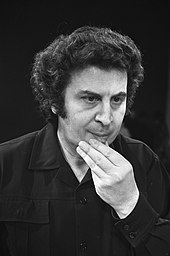Mikis Theodorakis
Despite this, however, he ran as an independent candidate within the centre-right New Democracy party in 1989, in order for the country to emerge from the political crisis that had been created due to the numerous scandals of the government of Andreas Papandreou.
In 1990, he was elected to the parliament (as in 1964 and 1981), became a government minister under Konstantinos Mitsotakis, and fought against drugs and terrorism and in favor of culture and education.
[21][22] His father, a lawyer and a civil servant, was from the small village of Galatas on Crete[23] and his mother, Aspasia Poulakis, was from an ethnically Greek family in Çeşme, in what is now Turkey.
He took his first music lessons in Patras[18] and Pyrgos,[20] where he was a childhood friend of George Pavlopoulos,[30] and in Tripoli, Peloponnese,[22] he gave his first concert at the age of seventeen.
[37] The following year, they travelled to Paris, where he entered the Conservatory and studied musical analysis under Olivier Messiaen[38] and conducting under Eugene Bigot.
[39] His symphonic works: a Piano concerto, his first suite, his first symphony, and his scores for the ballet: Greek Carnival, Le Feu aux Poudres, Les Amants de Teruel, received international acclaim.
[40] In 1959, after the successful performances of Theodorakis's opera Antigone at Covent Garden in London, the French composer Darius Milhaud proposed him for the American Copley Music Prize – an award of the "William and Noma Copley Foundation",[41] which later changed its name to "Cassandra Foundation" as the "Best European Composer of the Year".
[43] His most significant and influential works are based on Greek and world poetry – Epiphania (Giorgos Seferis), Little Kyklades (Odysseas Elytis), Axion Esti (Elytis), Mauthausen (Iakovos Kambanellis), Romiossini (Yannis Ritsos), and Romancero Gitano (Federico García Lorca) – he attempted to give back to Greek music a dignity which in his perception it had lost.
[44] He founded the Athens Little Symphony Orchestra and gave many concerts in the country, trying to familiarize people with symphonic music.
[46] Under Theodorakis's impetus, it started a vast cultural renaissance movement and became the greatest political organisation in Greece with more than 50,000 members.
Because of his political ideas, the composer was black-listed by the cultural establishment; at the time of his biggest artistic glory, a large number of his songs were censored-before-studio or were not allowed on the radio stations.
[48] During 1964, he wrote the music for the Michael Cacoyiannis film Zorba the Greek, whose main theme, since then, exists as a trademark for Greece.
He was released at the end of January 1968, and then deported in August to Zatouna with his wife, Myrto, and their two children, Margarita and George [de].
[53] An international solidarity movement, headed by such personalities as Dmitri Shostakovich, Leonard Bernstein, Arthur Miller, and Harry Belafonte demanded to get Theodorakis freed.
He arrived at Le Bourget Airport where he met Costa Gavras, Melina Mercouri and Jules Dassin.
In Valparaíso, he listened to a group of young people who introduced him to part of the work of the poet Pablo Neruda.
Back to Paris, in 1972 Theodorakis met Pablo Neruda when the Greek composer was rehearsing the musicalization of Canto General.
[58] He was received by Gamal Abdel Nasser and Tito, Yigal Allon and Yasser Arafat, while François Mitterrand, Olof Palme and Willy Brandt became his friends.
After his resignation as a member of Greek parliament, he was appointed General Musical Director of the Choir and the two Orchestras of the Hellenic State Radio (ERT), which he reorganised and with which he undertook successful concert tours abroad.
His most significant works written in these years are his Second, Third, Fourth, and Seventh Symphony, most of them being first performed in the former German Democratic Republic between 1982 and 1989.
[72] A final set of songs titled: Odysseia was composed by utilizing poetry written by Costas Kartelias for lyrics.
Epitaphs were delivered by the president of the Hellenic Republic, Aikaterini Sakellaropoulou, and the general secretary of the Communist Party of Greece, Dimitrios Koutsoumbas.
[88] On 31 May 2011, Theodorakis gave a speech attended by approximately 10,000 people in the center of Athens, criticising the Greek government for the loan debt it has taken from the International Monetary Fund.
"[91][92] The statements garnered support from parties in parliament, while even Golden Dawn MPs welcomed Mikis Theodorakis' shift on the name of Macedonia.
Also, the day before the rally, a group of anarchists threw paint at the entrance of his house and then wrote threatening messages, such as: "Your story starts from the mountain and ends in the national swamp of Syntagma Square.





